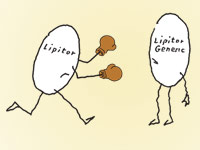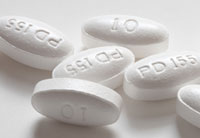As Lipitor Goes Off Patent,
What Will Happen to Price of Your Prescription?Pfizer strives to keep consumers, shut out genericsby: Patricia Barry | from: AARP Bulletin | November 30, 2011 The first generic version of the world's top-selling drug, the cholesterol-lowering Lipitor, is due to come on the market Dec. 1. Drug market analysts have long speculated on the strategies Lipitor's manufacturer, Pfizer, might use to hold on to at least some of the profits for a blockbuster drug that has earned up to $12 billion a year over the past 15 years. But even experts were taken aback by the scale and ingenuity of the Pfizer counter-attack against generic competition. The drugmaker has launched an unprecedented campaign to persuade patients to stay with Lipitor instead of switching to the generic, atorvastatin.  Many blockbuster drugs are expected to lose patent protection over the next 12 months. — Image by R.O. Blechman Typically, after a brand-name drug loses its patent, one other manufacturer gets six months to market a lower-cost generic copy exclusively — and prices it not far below the brand. After six months, other generic copies enter the market and prices plunge. Consequently, demand for the brand-name drug usually plunges, too. But Pfizer is trying to rewrite that playbook and keep Lipitor competitive — especially by making deals to block coverage of the new generic in some health plans. That strategy was revealed in mid-November when three large pharmaceutical benefits management companies (PBMs), which act as middlemen negotiating prices between the drugmakers and insurance companies, told pharmacists that, from Dec. 1 through May 31, many of the health insurance plans they represent will cover brand-name Lipitor but not its generic. "I was stunned," says Geoffrey Joyce, associate professor of pharmaceutical economics and policy at the University of Southern California. "I knew that Pfizer would be looking at ways to discourage consumers from using the generic. But blocking it completely seems like collusion between the manufacturer and large PBMs to prohibit a lower-cost drug." Among other Pfizer strategies: setting up its own mail order pharmacy to sell Lipitor at generic prices to people in health insurance plans; offering discount cards to uninsured people; and launching a massive advertising campaign to promote brand loyalty, with the pitch: "If Lipitor is working for you, why switch?" "This is not the first attempt by a manufacturer to extend the use and profitability of a brand drug past its patent expiration," says Joyce. "But clearly it's the most aggressive and multifaceted effort to date." The long-term strategy, he adds, is to get patients accustomed to using Lipitor "despite the availability of a generic." How do such deals affect consumers? It depends on whether you're covered by an employer plan, or other private insurance plan, by a Medicare Part D drug plan, or you're not insured at all.
People in employer plans Notices recently sent to pharmacists by the three big middlemen companies — Medco, Medimpact and Catalyst Rx — show that at least some of their client insurers will reduce copays for Lipitor to the level of a generic drug, perhaps about $10 or less for a 30-day supply, compared with a $25 or more copay now. That sounds like a good deal for patients —and certainly millions are likely see their Lipitor costs fall. But, critics say, if health plans still pay the full cost of the drug, there would be two consequences.  First, enrollees in plans that charge a percentage of the drug's cost, instead of a flat dollar copay, will pay a higher amount, according to the Medco notice. For example, if a 30-day supply of Lipitor costs the plan $160 and the plan charges 25 percent to enrollees, they would still pay $40 compared with the lower $10 or less. Second, if an employer plan doesn't receive the full rebate for Lipitor from its benefits management company, its costs would be higher than if it were covering the generic. In that case, the deal becomes a money-loser for the plan and enrollees will ultimately pay, says Dave Marley, an independent pharmacist in Winston-Salem, N.C. "Anything that increases the employer's expenses, you can be sure that next year the premiums, deductibles and copays will go up." Marley is the founder and a member of Pharmacists United for Truth and Transparency, a new association that opposes what it calls the behind-the-scenes role of PBMs in fueling escalating drug costs. His group first broke the news of the Lipitor deal by sending copies of the three notices to the press. Typically, the pharmaceutical middlemen make money out of rebates and do not necessarily pass on those savings to the insurance plans, says Stephen Schondelmeyer of the University of Minnesota, a national expert on drug pricing. Medco told Pharmacy Times that its notice applied only to one client, Coventry Health Care, a plan with 1.2 million enrollees, and that Medco would not keep any rebate dollars from Pfizer. In another unprecedented move, Pfizer also has set up a partnership with a large mail-order pharmacy to fill patients' Lipitor prescriptions. Health plans that have contracted with Pfizer to use this pharmacy would pay a generic-level price for Lipitor, while those that haven't will pay more, according to a Wall Street Journal report.
People in Medicare drug plans The Medicare prescription drug program works very differently from employer plans. Part D plans cover an individual's drug costs up to a certain level each year ($2,840 in 2011). This limit is based on the full price of the drug — what individuals contribute in copays and what the plan pays — and when it is reached, the coverage gap known as the "doughnut hole" begins and enrollees' costs become much higher. So if any Part D plans decide to cover Lipitor but not the generic, it could mean that people hit the doughnut hole a lot faster. Part D plans either use pharmaceutical-benefit managers or negotiate directly with the drugmakers on price. By law, the drug plans generally are free to choose which drugs they cover, and are not required to pass on any rebates to their enrollees or to Medicare. In 2008 alone, Part D plan insurers received $6.5 billion in rebates from drugmakers, according to a March 2011 report from the inspector general of the Department of Health and Human Services. But, experts say, these rebates have generally helped keep premiums lower. Marley of the pharmacist group says they are waiting to see what Part D plans do about Lipitor, but adds that there is a historical precedent. When the anti-heartburn pill Protonix lost its patent last year, some Part D plans blocked the generic and covered only the brand, he says, in "exactly the same scenario" as Lipitor. "In those cases, you had patients who were hitting the doughnut hole quicker and the federal government picking up the whole tab for low-income-subsidy patients." Some Medicare drug plans have already taken action. For example, in 2012, nine of the 33 Part D plans in Florida will drop Lipitor to a generic pricing level, with copays from $0 to $8 for a 30-day supply, according to Medicare's website.
And CVS/Caremark advised pharmacists this week that generic atorvastatin would not be covered in 29 Part D plans for which the company manages benefits. Instead, enrollees will get brand Lipitor at the generic copay price.
People without insurance These are men and women who most stand to benefit from a generic version of Lipitor, for which they have been paying full price at the pharmacy. But they're unlikely to see their costs reduced much in the next six months. During that time, the generic's price is expected to undercut Lipitor's by only about 10 to 20 percent, Schondelmeyer explains. And even if Pfizer brings down Lipitor's cost to the level of the generic, uninsured customers are unlikely to see much price difference. But starting June 1 other generic drugmakers can compete and their drugs are expected to lower the generic price dramatically. Lipitor now typically costs $5 to $6 per pill when not covered by insurance. "By next fall, the [generic] price will be down to about $2 a pill, and by 2013 it will probably be down to 50 or 25 cents," Schondelmeyer says. Meanwhile, in another bid to encourage continued loyalty to the Lipitor brand, Pfizer is pitching discount cards for people not covered by private insurance or government programs — in some cases as low as $4 for a 30-day supply. Setting a precedent? Many blockbuster drugs are expected to lose patent protectionm over the next 12 months, opening the way to lower-cost generics — among them Plavix (heart attack prevention), Avandia (diabetes), Singulaire (allergies and asthma) and Lexapro (depression). Could their manufacturers cut deals similar to Pfizer's? "You have to wonder at the precedent [the Lipitor strategy] sets," says Joyce. "If Pfizer is successful, other manufacturers will follow some or all of these approaches." Meanwhile, the Federal Trade Commission is said to be closely watching developments. Drug market analysts say FTC officials have been inquiring into the PBM deals over Lipitor. The agency declined to comment or say whether it is actively investigating the issue. But in recent years the FTC has vigorously pursued other types of tactics to delay generic competition — in particular one called "pay for delay" in which a brand-name drugmaker pays a generic manufacturer to stay out of the market for several months. The FTC estimates that these deals currently protect at least $20 billion in sales of brand-name drugs from competition, and cost American consumers $3.5 billion a year, including about $1.2 billion paid by the federal government.
The AARP Bulletin contacted Pfizer for comment and was invited to email questions to the company. Pfizer did not respond to them. Patricia Barry is a senior editor of the AARP Bulletin who writes about Medicare and health policy issues.
| 










Medical practitioners should know about what our patients have to go through.
Just writing prescriptions may not be enough.
Once in a while, should we look at the matter in their shoes?
Should we be the forerunners in stopping the escalating cost of medical care?
Or, we will be the victims of drug companies in the end.